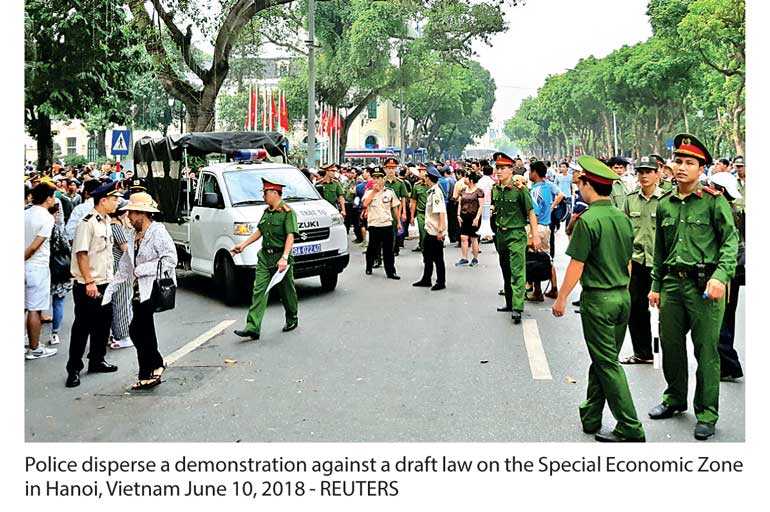Tuesday Feb 24, 2026
Tuesday Feb 24, 2026
Monday, 11 June 2018 00:00 - - {{hitsCtrl.values.hits}}
 Hanoi (Reuters): Police in Vietnam detained more than a dozen protesters in the capital Hanoi yesterday and halted demonstrations in other cities against plans for new special economic zones that the protesters fear will be dominated by Chinese investors.
Hanoi (Reuters): Police in Vietnam detained more than a dozen protesters in the capital Hanoi yesterday and halted demonstrations in other cities against plans for new special economic zones that the protesters fear will be dominated by Chinese investors.
Vietnam said in May last year it planned to open three special economic zones that offer investors greater incentives and fewer restrictions than available in the country at present.
The draft law does not identify potential foreign investors that can lease land for up to 99 years in the zones, but the protesters fear it will be dominated by neighbouring China.
The demonstrators carried anti-China banners, including one that said “No leasing land to China even for one day”, on a busy street near Hanoi’s Hoan Kiem Lake.
Police later bundled more than dozen protesters into vehicles and drove away. Similar demonstrations took place on Sunday in other cities throughout the country, including the economic hub Ho Chi Minh City, and were dispersed by police, activists said on social media. It was not clear if other protesters had been detained.
The Government said on Saturday (9 June) that it had asked the National Assembly to delay a vote on the draft law to allow for more research on the legislation.
“The bill is designed to give a strong boost to the development of three special administrative and economic units, including Van Don in Quang Ninh province, Bac Van Phong in Khanh Hoa province and Phu Quoc in Kien Giang province, and room for institutional experiments,” the Government said in a statement.
The initial draft law had said land in the zones could be leased for up to 99 years, but Prime Minister Nguyen Xuan Phuc told local media last week the term would be reduced, although he did not say for how long.
The protests come at a time of rising tensions over the disputed South China Sea, nearly all of which is claimed by China.
Vietnam is among several countries in the region that have claims in the South China Sea, through which an estimated $5 trillion in trade passes each year.